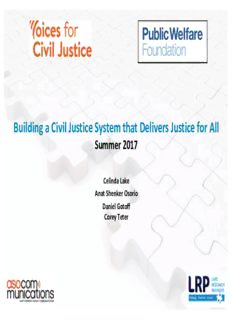
LRP-ASO Report PDF
Preview LRP-ASO Report
Building a Civil Justice System that Delivers Justice for All Summer 2017 Celinda Lake Anat Shenker Osorio Daniel Gotoff Corey Teter Key Findings • Voters have favorable views about various components and players in the civil justice system, including “civil legal aid,” “pro bono lawyers,” and “the judicial branch.” • Voters have tepid assessments about the performance of the civil justice system, with half giving it marks of “just fair” or “poor.” • Voters strongly favor reform of the civil justice system, with half saying it needs to be “rebuilt completely” or “fundamentally changed.” 2 Key Findings • Overwhelming majorities of voters believe it is important to ensure that everyone has access to the civil justice system, whether framed as “legal representation” or “legal help.” • Voters believe low-‐income individuals – especially those living in rural areas – and people struggling to make ends meet face the most difficulty in obtaining legal help. • Voters support increasing state funding to build a more accessible civil justice system, and, surprisingly, their support is not very tax sensitive. 3 Key Findings • Messages anchored in core values resonated strongly with voters. Strongest values include: – Equal justice under the law is a right, not a privilege – Equal justice under the law and justice for all both tested very well. 4 Key Findings – Our legal system allows the wealthy and powerful to mistreat ordinary Americans and avoid accountability – There can be no justice if most people are denied access to legal representation and help – The trouble it takes to file or defend a lawsuit discourages many people with legitimate cases from going to court – Strong messages are anchored in values and founding principles. They speak to creation of a good rather than elimination of a harm 5 Key Findings • Voters overwhelmingly support the most traditional and familiar form of service to ensure access to the civil justice system – namely, having a lawyer. • Voters also strongly support a wide range of services to enhance access. Examples of such services that garnered strong support include: – Training judges to ask questions in plain and understandable language so people without lawyers can have their cases heard 6 Key Findings – Offering a system that enables everyone to get access to the information and effective assistance they need, when they need it, and in a form they can use. Information services are especially powerful to independents and many voters. – Developing more affordable payment systems like co-‐ payments or sliding-‐scale fees so working and middle class people can get the legal help they need, even if they cannot pay in full • While the strong levels of support are encouraging, our task moving forward must be to increase voters’ awareness of the problems facing the civil justice system as well as the urgent need for solutions. 7 Building on Lessons from Previous Research • This new round of research builds on focus group and survey research conducted by Lake Research and The Tarrance Group in 2013 and additional focus group research in 2015. • The prior research disclosed that civil legal aid is a largely invisible issue for the American public. • While most people have little awareness about civil legal aid or the value it adds, when they are educated on the topic, they are highly supportive. 8 Building on Lessons from Previous Research • Voters embrace a broad definition of civil legal aid, one that includes legal assistance and representation; self-‐help centers and other court-‐based services; free legal clinics and pro bono assistance; and access to online information and forms. • The 2015 focus groups confirmed that lack of money is still seen as THE impediment to having access to the civil justice system. • Another significant impediment is lack of knowledge – knowing when you need legal help and where to get it. 9 Methodology Cognitive Linguistic Analysis • 600 data points from… ü Advocacy (left and right) ü Opposition ü Media ü T.V. 10 10
Description: